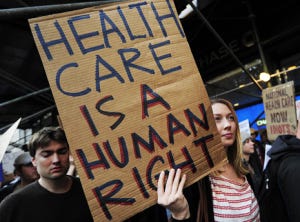Healthcare – Right or Privilege?

Is healthcare a right or a privilege? The answer varies by country. In most of the world it is a right accorded to all residents as part of their social safety net. However, in the United States it is a privilege accorded to the more fortunate – those who have private health insurance, seniors over 65 who have Medicare and Medicaid for a small percentage of low income individuals. For those not falling into one of those categories they are “on their own.” This generally means neglecting medical conditions in the early stages when they are more easily treatable. It often leads to expensive trips to the emergency room when the condition becomes acute and where only the symptoms can be treated without a provision for follow-on care.
Medical bills are the major reason for bankruptcy in the United States. Without health insurance many citizens are forced to pay out of pocket for expensive for-profit medical treatment. This has been exacerbated by the housing crisis. Unscrupulous lenders convinced people to borrow against the equity in their homes. Americans were encouraged to use their home as a piggy bank to pay for accumulating medical bills in the case of long term or serious illnesses. That put people in a position of either minimizing treatment of their medical condition or risk losing their home. In many cases where treatment could no longer be delayed they lost their health and their home. This tragic situation could not happen in any other developed country in the world.
Because the United States depends on profit making private insurance companies to provide healthcare, it has the highest per capital health care costs in the world. Supporters of the for-profit companies claim that in return for the cost we have the best healthcare system in the world. This view is another aspect of the myth of American exceptionalism. The facts based on key international health indicators tell another story. Based on the latest WHO (2010) data, U.S. life expectancy ranks 29th in the world. Healthy life expectancy fares even worse – 34th in the world and infant mortality ranks a grim 158th. These are staggering statistics for the most expensive healthcare system in the world. We are the wealthiest country in the world, yet we let our less affluent citizens go without the care that can preserve their health and save their life.
Under Obamacare, an effort was made to reform some of the most odious aspects of the system. Essentially it was not actually healthcare reform but health insurance reform. Insurance companies were required to cover people with pre-existing conditions and certain aspects of preventative care were covered at no cost to the beneficiary. In return, private insurance coverage became mandatory for all citizens in a system that had no real cost controls. Drugs continue to be expensive under a provision that makes it illegal for Medicare to negotiate for the price of drugs and approximately 30 million people remain uninsured.
While Republicans and insurance lobbyists continue to sing the praises of private insurance and criticize Medicare, the facts tell another story. Not only are most seniors happy with Medicare, but it is actually more cost effective than private insurance. Without having to pay multi-million dollar salaries to top executives, Medicare has an overhead of 1.5 to 2% versus 20-30% for private insurers. In recent “fiscal cliff” negotiations, Republicans and Obama discussed raising the age for Medicare from 65 to 67. That would represent an increase in health care costs during the additional 2 years added to the waiting period for eligibility. In addition, health care companies would be reluctant to accept seniors in that age category, many of whom may have serious health issues.
Instead of raising the eligibility age for Medicare, it should be reduced to 55 when many seniors start to experience chronic health problems. Better yet, we should have a Medicare-for-all or Single Payer system. The administrative structure is already in place. It would be a matter of phasing in the rest of the population over a 1-2 year time frame. That would take the profit out of healthcare and provide universal coverage for all of our citizens.
The insurance lobby is strong and it won’t be easy to remove them as the middle man in the healthcare system. Single payer is not likely to be approved at the federal level in the wake of Citizens United. Our legislators are too dependent on campaign contributions for their political survival. The more likely course is state by state – as was the case in Canada. Tommy Douglas, the premier of the province of Saskatchewan introduced universal health care to his constituents. The system was so popular it was eventually adopted countrywide. In recognition for his contribution to Canada’s quality of life Tommy Douglas was voted “The Greatest Canadian” of all time.
It can happen here. We need a few progressive states like California to lead the way. Ultimately the states can be the testing ground. As citizens in the early adopter states reap the benefits, the demand will grow across the country – ultimately creating a wave that moves the predatory insurance companies out of its path and delivers universal health care for all. What we need now are a few brave citizens to start the movement – one person at a time until our goal is achieved.Vera Moldt
The opinions expressed in this article are those of the author, and do not necessarily reflect those of the Point Loma Democratic Club of which she is a member.



